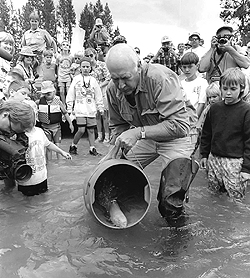forum
library
tutorial
contact

Ex-governors Urge White House
to Address Columbia Salmon Runs
by Matthew PreuschThe Oregonian, August 4, 2009
|
the film forum library tutorial contact |

|
Ex-governors Urge White House
by Matthew Preusch |
 Three former Northwest governors are urging the Obama administration to reject a Bush-era plan designed to save the region's salmon.
Three former Northwest governors are urging the Obama administration to reject a Bush-era plan designed to save the region's salmon.
The letter made public today from John Kitzhaber, Cecil Andrus and Mike Lowry is the latest high-profile plea to the president to engage on the persistent problem.
And a coming court deadline means Obama's salmon policy should be clear soon.
The administration has until Aug. 14 to decide whether to defend, amend or ditch a plan put forward last year to run federal power-producing dams on the Columbia and Snake rivers without pushing imperiled salmon closer to extinction.
U.S. District Court Judge James Redden has hinted that the plan, supported by most Northwest tribes and the state of Washington -- but not Oregon or a coalition of environmental and fishing groups -- may not meet the requirements of the Endangered Species Act.
"We think the District Court's guidance letter, issued May 21, indicates that the plan, like its two predecessors, is likely to be found illegal if you decide to support it. We urge you not to take that course," wrote Kitzhaber, Andrus and Lowry, the former governors of Oregon, Idaho and Washington, respectively.
The letter echoes recent calls from Idaho's two Republican senators and Oregon's new senator, Democrat Jeff Merkley, for the new administration to lead competing regional interests toward an enduring strategy for the 259,000-square-mile Columbia Basin's salmon runs.
Federal courts rejected two earlier plans, called biological opinions, to square the operation of the Northwest's giant hydropower dams with the survival of salmon that must migrate past them on their journey between their native streams and the sea.
The most recent plan has broader support than past versions.
"We believe that an unprecedented regional consensus has already been reached in this biological opinion, with only a couple of outliers, and that we need to move forward," said Terry Flores, executive director of Northwest River Partners, a coalition of shipping interests, power users and others who support the current plan.
But the state of Oregon and environmental groups continue to challenge the plan in court, and their hope is the change in administrations might mean its demise. Since taking office, the Obama administration has asked Redden for more time to weigh whether to back the current plan.
In May, top administration officials, including Jane Lubchenco, the former Oregon State University scientist and current head of the National Oceanic and Atmospheric Administration, visited the Northwest to meet with biologists, dam-operating agencies, politicians and others about salmon. And they've continued to hear from people in the region during closed door meetings in Washington, D.C.
But Lubchenco and others have so far kept quiet on what their strategy is for the iconic fish, whose recovery costs have run into the billions of dollars.
Redden has said the biological opinion should include a contingency plan to consider breaching four dams on the lower Snake River if wild salmon edge closer to extinction.
That has reopened an old debate, one Kitzhaber was intimately involved in during his time in office, over whether dam removal is necessary to save salmon. In 2000, Kitzhaber made headlines by coming out in favor of dam removal as one part of a larger strategy to restore wild salmon.
But the political landscape is different now: More regional leaders say dam removal should at least be on the table. And some businesses in inland ports dependent on the dams are now open to them being removed if it includes support for improving rail and road infrastructure.
"Right now the weak link are the Washington senators, who at best have been silent on this issue," said Nicole Cordan, an attorney for Save Our Wild Salmon, which facilitated the governors' letter to Obama.
The letter doesn't mention the dams, saying only that federal leadership is the missing ingredient to finding a regional settlement.
"We believe the time has come, and is propitious, for settlement talks under the court's aegis on law and science, and under your leadership for related economic and political issues," the letter says. "Dialogue among key parties on the salmon, energy, water and job issues at stake here has never entirely died, but it was not a priority for the last administration."
learn more on topics covered in the film
see the video
read the script
learn the songs
discussion forum
